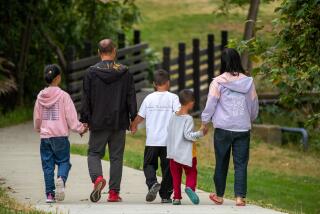Chinese Nurses Study Way of West
- Share via
When Golden West College professor Martha Weaver discovered that two of her students had hitchhiked to school recently, she worried that it could have started a global crisis.
“I thought, my God, if one of them gets kidnaped we could have an international incident on our hands,” she said.
The next day she appealed to her students, a group of 20 Chinese nurses, “Please don’t do that.”
Weaver’s concern was echoed by Grayce Roessler, called “Mom” by the Chinese nurses whom she brought to study for two semesters at the Huntington Beach college.
A First Since Revolution
The program marks the first time Chinese nurses have studied in this country since the Communist revolution in 1949. Its purpose, Roessler said, is to bring Western medical techniques to China.
Roessler, the college’s coordinator of continuing education for health professionals, envisioned the program when she visited China with the American Nurses Assn. in 1981.
Since the start of the Cultural Revolution, which lasted from 1966 to 1969, education for nurses in China has declined, Roessler said. Many medical textbooks were lost, and the standards for entrance into nursing programs were lowered during the upheaval, she said.
Since 1973, exchange programs have existed for Chinese doctors, but not nurses, Roessler said.
“It would be impossible to improve health care in China with only physicians coming overseas. Most people think that all nurses do is follow doctors’ orders. Well, this is a fallacy.”
Roessler met with China’s medical leaders during two more visits before she wrote to Communist Party Chairman Deng Xiao Ping asking for his assistance in starting the program.
Government Support
With Deng’s support, the Chinese Nursing Assn. and the Ministry of Health selected the nurses, who scored high on a series of examinations, Roessler said.
The Chinese government paid $24,000 for the students’ air fare and gave them a small amount of cash to live on, while Golden West paid for instructional materials. Private donations have covered other costs.
The women, who speak English and range in age from 22 to 45, arrived Sept. 27. They live with host families throughout the county who provide them with meals and transportation to the campus.
“They have opened their hearts to us and treat us as daughters,” said Xiao Xing Jiang, 28. “I feel like I am part of the family.”
The nurses learn Western medical terminology and how Western schools teach nursing students. They also observe procedures at local hospitals and compare nursing care in the United States and China. The goal is not to replace their medical practices but supplement their education.
“We expose them to modern equipment, but they do not learn how to use it. If an American company sells a product to China, they will send people over to train them,” Weaver said.
Wants to Teach
Jian Ming Xu, 29, who hopes to become a nursing teacher, said she plans to use American teaching methods such as classroom discussions.
“I want to use the active method of teaching, not just lecture,” she said.
The program also involves topics discussed in American nursing classrooms but not Chinese. For example, Weaver said, “in nursing schools in China, they are not taught about how to deal with a terminally ill patient, what that patient would be thinking or feeling.”
Xiao said the lessons about treating the total patient, mind and body, have been useful.
“During the Cultural Revolution they said that psychotherapy is not important. Now that mental illness and high blood pressure have increased, they pay more attention,” she said.
Another aspect of nursing common to both cultures is dealing with minority populations. China has about 55 ethnic minority groups.
Issue of Ethnicity
“We are teaching them to consider how to treat someone with another ethnic background. You must take into account that person’s concepts about health and medicine before you treat them, which may differ from the majority population,” Roessler said.
But the nurses said the program has taught them more than just modern nursing techniques. It has given them an opportunity to live in another country, an experience not possible for most of China’s millions.
The Chinese can only leave their country for business reasons or to study, the nurses said.
“The whole world is out there. If you don’t see other people, then it is like living in a cave and not coming out,” Gui-Fang Guo, 25, said.
“The open-door policy is good. That way we can compare and use what we like,” she said.
Another nurse, Rong-Rong Hu, 31, said: “I love California. The people are very friendly. I would stay another year if I could.”
More to Read
Sign up for Essential California
The most important California stories and recommendations in your inbox every morning.
You may occasionally receive promotional content from the Los Angeles Times.













